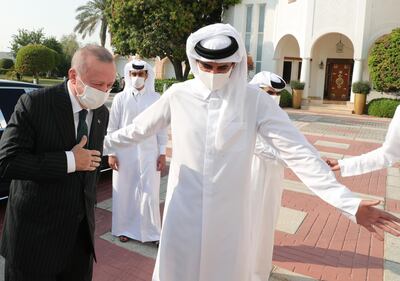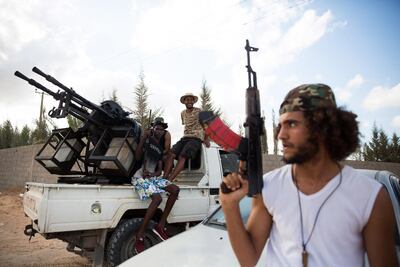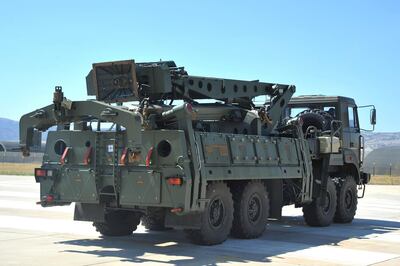Last week, Turkey finally responded to the two-year-old, semi-official Saudi embargo on its imports, investment and tourism. “We just laugh at some countries’ boycotts and move on,” Numan Kurtulmus, deputy chair of the ruling Justice and Development Party (AKP), said in an interview.
The laughter in Ankara must be increasingly nervous these days, as the boycott now stretches far beyond the Kingdom and is starting to bite at the worst possible time.
Turkish contractors in the Middle East have lost an estimated $3 billion in the past year, the head of the Turkish Contractors Union noted last week. Fashion retailers Mango and Zara are looking to move production out of Turkey because Saudis and other Gulf citizens are refusing to buy clothes made there.

In Saudi markets, more goods from Egypt, Morocco and Greece are popping up as Turkish items disappear. Earlier this month officials in Rabat approved an amendment to the Morocco-Turkey Free Trade Agreement that increased tariffs up to 90 per cent on 1200 Turkish goods. Meanwhile, Armenia and Armenians in the diaspora have launched their own "boycott Turkey" campaigns in response to Ankara's military support for Azerbaijan in the South Caucasus.
None of this is doing Turkey's troubled economy any favors. Foreign arrivals fell nearly 75 per cent in the first 8 months of the year. Emre Deliveli, an economist who owns a hotel on the Aegean coast, says his resort has brought in about 30 per cent of last year’s revenue. Last week, Ankara announced a 10bn lira rescue package for the tourism industry, but Mr Deliveli says the interest rates on the loans, up to 14.5 per cent, are too high to be of much help. The Turkish lira is on its worst streak in more than 20 years, regularly hitting record lows against the dollar, and Covid-19 cases are again on the rise, which may explain why economists are predicting an economic contraction of 3.4 per cent in Turkey this year.
Enter Qatar. Turkish President Recep Tayyip Erdogan visited Emir Tamim bin Hamad Al Thani in Doha a fortnight ago, shortly after a Qatari official announced the imminent expansion of bilateral co-operation. Also this month, a pro-government Turkish columnist quoted Sheikh Tamim as saying he views Mr Erdogan as a father to whom he owes undying loyalty, days after Turkey inaugurated a training warship built especially for Qatar's navy. "Both countries act as one heart, one fist in close co-operation and coordination on regional issues," Turkish Defence Minister Hulusi Akar said at the event.
That co-operation traces back to June 2017, when most Gulf states and Egypt severed trade and transport links with Qatar. Turkey swooped in to provide food, supplies and military support. Doha has since been returning the favour. When Turkey faced a sharp economic downturn in 2018, Qatar fast-tracked a $3bn currency swap and $15bn in investment. Trade between the two leapt 85 per cent that year. More recently, Turkey has expanded its military footprint, opening a new base outside Doha last year that hosts 5,000 Turkish troops.
“The Turkish military presence in the Arab Gulf is an emergency,” the UAE's Minister of State for Foreign Affairs, Dr Anwar Gargash, said last week.
It's one of a handful of pressing issues between the rivals. In northeastern Syria, Turkey-backed rebels launched a series of attacks on Kurdish positions this week. Any re-intensification of violence in northeast Syria is unlikely to calm regional waters. As I have written in these pages previously, Egypt last month urged its allies to join forces to counter Turkish aggression, particularly in Syria.
In Libya, where Turkey and Qatar back the Tripoli-based Government of National Accord, Mr Erdogan last week questioned the credibility of the latest ceasefire, suggesting that the civil war there is set to continue for some time. Sudan's allies in the Gulf have sought to counter any Turkish influence there for years, and the recent decision of the transitional military council in Khartoum to normalise relations with Israel suggests that those efforts are proving successful.
Turkey has developed a formidable domestic defence sector over the past decade, and has displayed its weapon-making prowess in Libya and Syria. While it signed a significant defence co-operation deal with Ukraine this month, however, Turkey’s arms exports took a hit this year, falling more than 26 per cent through August as a result of embargoes by European states. And Ankara's position as a puchaser and key figure in the supply chain for US F-35 fighter jets is now in doubt in the wake of its purchase of Russian S-400 missile defences.
Ongoing competition between regional powers in the Middle East and North Africa has taken on greater urgency as US President Donald Trump has drawn down American commitments there. That may or may not continue in the months ahead. But regardless of who wins next week’s US presidential election, Washington in 2021 seems pre-disposed to continue its harsh stance toward Turkey because of the latter's positions on the Muslim Brotherhood and Israel, in addition to its defence procurement from Russia and aggressive moves in the eastern Mediterranean.
In a discussion a year ago on the Turkey-Qatar alliance, King's College lecturer David Roberts explained to me that geography would win out in the end and that the Gulf states would find a way to resolve the crisis, sharply reducing the need for close Turkey-Qatar ties. Yet as 2020 draws to a close, any resolution seems far away. The Turkey-Qatar embrace grows ever tighter, deepening their isolation – and possibly giving their rivals the last laugh.
David Lepeska is a veteran journalist who has been covering Turkey for the past decade




